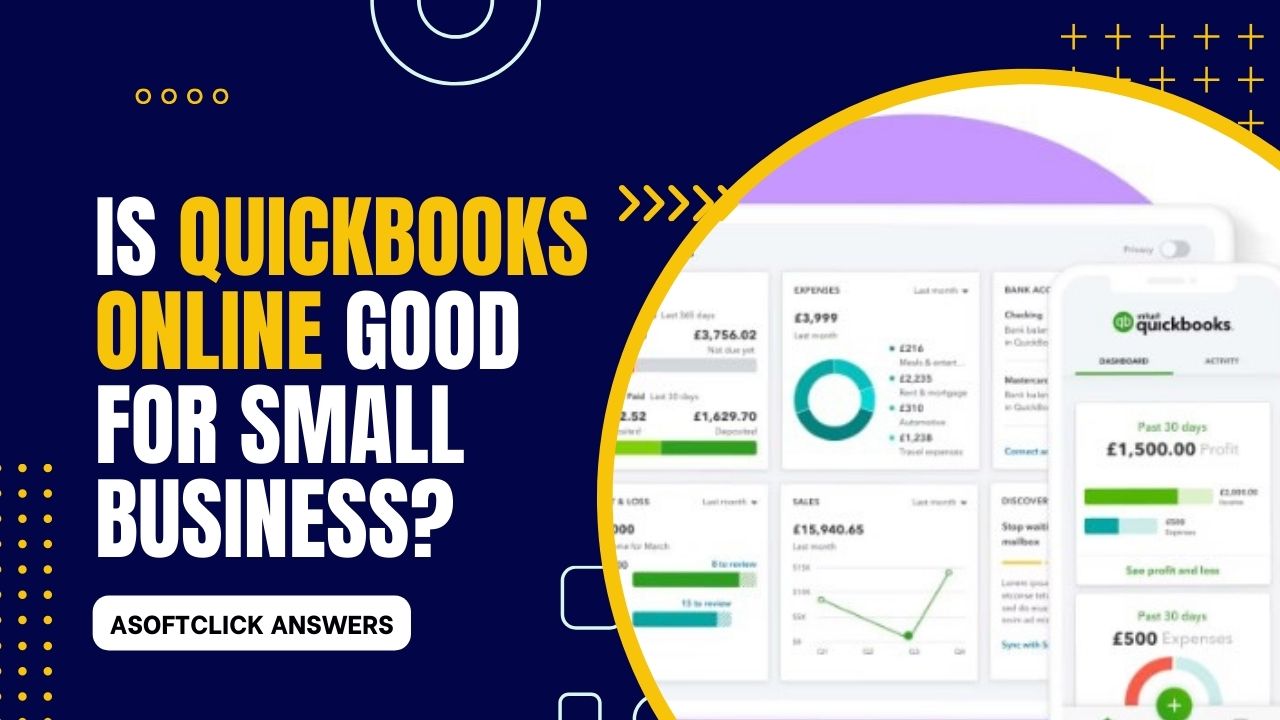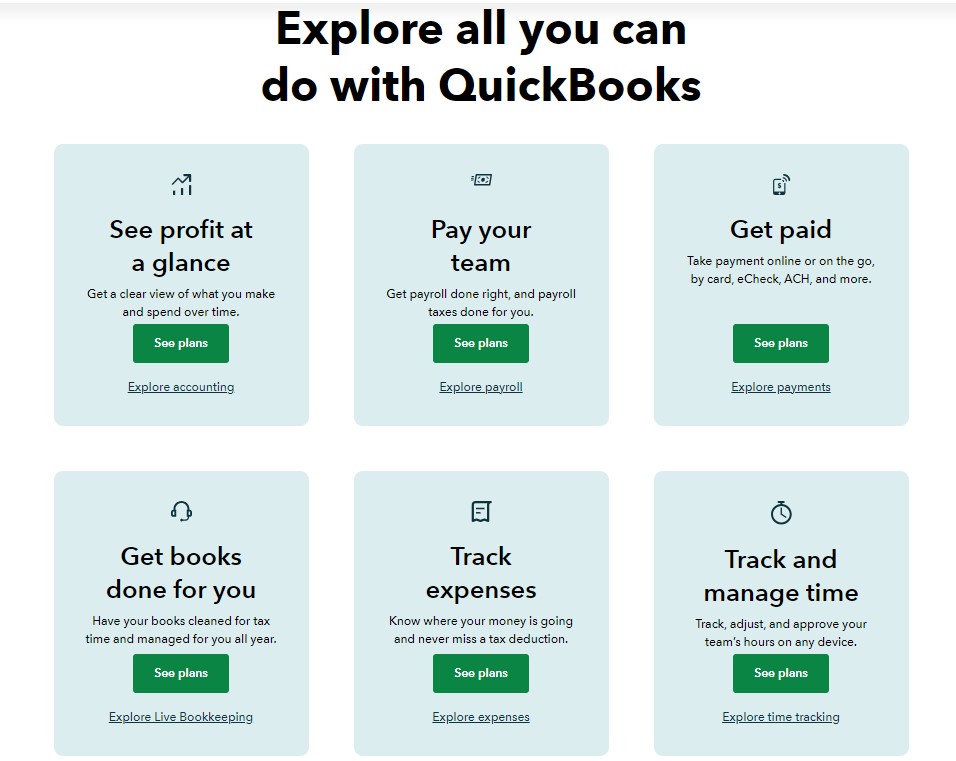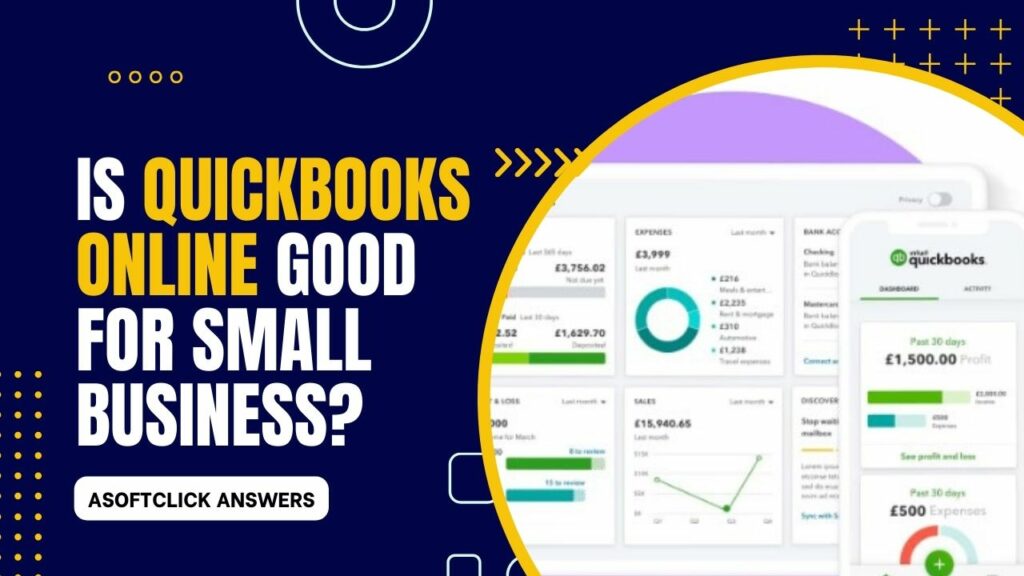 Managing finances in a business means keeping track of the money coming in and going out. It’s like making a plan for your money, watching your expenses, and making smart choices to help the business grow. Good financial management is vital for a business to stay strong and make the right investments for the future. Quickbooks is one of the most popular accounting software. But is Quickbooks online good for small business? Let’s find out.
Managing finances in a business means keeping track of the money coming in and going out. It’s like making a plan for your money, watching your expenses, and making smart choices to help the business grow. Good financial management is vital for a business to stay strong and make the right investments for the future. Quickbooks is one of the most popular accounting software. But is Quickbooks online good for small business? Let’s find out.
What is Quickbooks Online?
QuickBooks Online is a cloud-based accounting software platform developed by Intuit. It is designed to help individuals and small to medium-sized businesses manage their finances efficiently. With QuickBooks Online, users can perform various financial tasks such as invoicing, expense tracking, payroll processing, bank reconciliation, and generating financial reports. Its cloud-based nature allows users to access their financial data from anywhere with an internet connection, making it a convenient and flexible solution for businesses to handle their accounting needs.
How QuickBooks Online works: Features

QuickBooks Online works as a cloud-based accounting software, which means it operates entirely over the internet. Here’s a simplified explanation of how it works:
Sign-Up and Setup
Users sign up for a QuickBooks Online subscription and set up their account. They input basic company information and connect their bank and credit card accounts.
Data Entry and Import
Users can manually enter financial data like invoices, expenses, and payroll information into QuickBooks Online. Alternatively, they can import data from their bank accounts, credit cards, and other financial sources, saving time and reducing errors.
Categorization and Organization
QuickBooks Online categorizes and organizes financial transactions into appropriate accounts and categories. This helps in creating a structured financial record.
Financial Reporting
Users can generate various financial reports such as profit and loss statements, balance sheets, and cash flow statements. These reports provide insights into the financial health of the business.
Invoicing and Payments
QuickBooks Online allows users to create and send invoices to customers. It also facilitates online payments, making it easier for customers to pay.
Expense Tracking
Users can track business expenses, including receipts and bills. QuickBooks Online can also assist in managing and paying bills on time.
Payroll Processing
For businesses with employees, QuickBooks Online offers payroll processing services, including calculating salaries, and taxes, and generating pay stubs.
Tax Preparation
QuickBooks Online can help prepare and organize financial data for tax filing. It may integrate with tax software to streamline the process.
Collaboration
Multiple users, such as accountants or business partners, can collaborate on the same QuickBooks Online account, making it easier to work on financial tasks together.
Access Anywhere
Since it’s cloud-based, QuickBooks Online can be accessed from anywhere with an internet connection. This allows business owners to check their financial data or perform tasks on the go.
Security and Backup
Intuit, the company behind QuickBooks, ensures data security and provides regular backups to prevent data loss.
You might also like: The Best Software: What System to Use for Small Business
What are the advantages of Quickbooks Online?

1. Robust feature set
QuickBooks Online offers a robust feature set that simplifies financial management for businesses. Its scalability accommodates different business sizes and evolving needs, while its automation reduces manual tasks and errors. Real-time data access enables informed decision-making, and customization options adapt the software to unique requirements. Seamless integration with third-party apps enhances functionality, and its cloud-based nature provides accessibility and flexibility. Regular updates and support services contribute to its overall value and effectiveness as an accounting solution.
2. Integrations include live, in-house bookkeeping
One of the significant advantages of QuickBooks Online is its ability to integrate with various services, including offering live, in-house bookkeeping options. This integration simplifies financial management for businesses by providing access to professional bookkeeping services that can help maintain accurate records, manage transactions, and ensure compliance. This feature streamlines the accounting process and allows businesses to focus on other critical aspects of their operations while ensuring their financial records are well-maintained and up-to-date.
3. Easy to find QuickBooks resources
QuickBooks Online provides extensive documentation, tutorials, and user guides to assist users in learning how to use the software effectively. Additionally, there is a large community of users and experts who share insights, tips, and troubleshooting advice online. This wealth of resources makes it easier for users to get the most out of QuickBooks Online and resolve any issues they may encounter quickly.
What are the disadvantages of Quickbooks Online?
1. Monthly plans can be expensive
A disadvantage of QuickBooks Online is that its monthly subscription plans can be expensive for some businesses, particularly smaller enterprises or startups with tight budgets. The cost can add up over time, making it less cost-effective compared to one-time purchase software options. Additionally, the pricing tiers can become complex, and businesses might find they need to upgrade to a higher-priced plan to access certain features or accommodate their growing needs. It’s essential for businesses to carefully consider their financial situation and needs before committing to a QuickBooks Online subscription.
2. Learning curve
Another disadvantage of QuickBooks Online is its learning curve, especially for users who are new to accounting software. QuickBooks Online, while user-friendly, can have a complex interface with various features and settings. Understanding how to navigate and make the most of these features can take time, which may lead to initial confusion and potential errors in financial management. Businesses often need to invest time in training or hiring professionals to use the software effectively, which can be an added cost. However, with dedication and training, many users can overcome this learning curve and utilize QuickBooks Online efficiently.
Is QuickBooks online good for small business?
QuickBooks Online is an excellent choice for small businesses. Its cloud-based nature provides accessibility and flexibility, allowing business owners and their teams to manage finances from anywhere with an internet connection. This is particularly advantageous for small businesses with limited office space or those with remote teams. Additionally, QuickBooks Online offers a comprehensive feature set, including invoicing, expense tracking, payroll processing, and financial reporting. These tools help small businesses streamline their financial operations, save time, and reduce the risk of errors, ultimately leading to better financial management and growth potential.
Furthermore, QuickBooks Online provides scalability, meaning it can adapt as a small business grows, accommodating increasing transaction volumes and complexity. This ensures that small businesses won’t outgrow the software as they expand. To answer the question, “Is QuickBooks Online good for small business?” know that it’s essential for small business owners to carefully evaluate their specific needs and budget to determine if QuickBooks Online is the right fit for their financial management requirements.
You might also like: Top 10 Best Cash Flow Management Tools for Your Business
5 ways your small business can use QuickBooks Online

Here are some ways you can use Quickbooks online for your small business.
1. Create, Send & Track Invoices
Small businesses can use QuickBooks Online to create, send, and track invoices efficiently. This feature is highly beneficial because it streamlines the invoicing process, helps maintain a professional image, and ensures timely payment. Here’s how it works:
1. Create Invoices. QuickBooks Online allows small businesses to create customized invoices with their logo, payment terms, and itemized products or services. This professional presentation can leave a positive impression on clients and customers.
2. Send Invoices. Once the invoice is ready, it can be sent directly to clients through QuickBooks Online. You can choose to send them via email or print and mail them if needed.
3. Track Invoices. QuickBooks Online provides a dashboard where you can easily track the status of your invoices. You can see when an invoice has been viewed by the client and if payment is pending. This helps you stay on top of your accounts receivable and follow up as necessary.
4. Online Payments. QuickBooks Online also allows you to set up online payment options, making it convenient for clients to pay electronically, which can speed up the payment process.
2. Keep Track of Bills & Expenses
QuickBooks Online is a valuable tool for small businesses to keep track of bills and expenses. Here’s how it assists in this aspect:
1. Bill Management. Small businesses can enter and categorize bills into QuickBooks Online, specifying due dates and payment terms. This helps in organizing and prioritizing payments.
2. Expense Tracking. QuickBooks Online allows users to record all business expenses, whether they are incurred through credit card purchases, bank transactions, or manual entries. These expenses are categorized for easy reference.
3. Bill Payment. QuickBooks Online supports bill payment functionality. You can schedule payments directly through the platform, which helps ensure bills are paid on time and avoids late fees.
4. Receipt Capture. Using the mobile app, you can capture and attach receipts to expenses. This digital record-keeping eliminates the need for paper receipts and simplifies the process during tax time.
5. Expense Reporting. The software generates expense reports, which can be vital for analyzing spending patterns, making budget decisions, and preparing for tax deductions.
6. Expense Analysis. QuickBooks Online provides tools for analyzing expenses, helping small businesses identify areas where they can cut costs or allocate resources more efficiently.
3. Pay Bills Online
Small businesses can use QuickBooks Online to pay bills online conveniently. Here’s how it facilitates online bill payments:
1. Bill Entry. Small businesses can enter details of their bills into QuickBooks Online. This includes the vendor’s information, bill amount, due date, and any discounts or terms.
2. Bill Scheduling. QuickBooks Online allows businesses to schedule bill payments for future dates, ensuring that bills are paid on time and helping to avoid late fees.
3. Payment Options. Small businesses can link their bank accounts or credit cards to QuickBooks Online. When it’s time to pay a bill, the software can initiate electronic payments directly from the linked accounts.
4. Multiple Payment Methods. QuickBooks Online provides flexibility by supporting various payment methods, including ACH transfers, credit card payments, and even printing physical checks if needed.
5. Bill Payment Tracking. The software tracks all bill payments, creating a clear record of transactions for future reference and reporting purposes.
6. Payment Reminders. QuickBooks Online can send payment reminders to ensure that bills are not overlooked, helping maintain a positive relationship with vendors.
4. Customize Your Expense Classifications With a Chart of Accounts
QuickBooks also helps small businesses customize their expense classifications through a Chart of Accounts. Here’s how it works:
1. Chart of Accounts. QuickBooks Online provides a Chart of Accounts, which is a list of all the accounts where a business records its financial transactions. These accounts can be customized to suit the specific needs and structure of the business.
2. Customization. Small businesses can add, edit, or delete accounts within the Chart of Accounts to match their unique expense classifications. This allows for precise tracking of expenses in a way that aligns with the business’s operations and financial reporting requirements.
3. Subaccounts. QuickBooks Online also supports subaccounts, which can be used to create a hierarchical structure within the Chart of Accounts. This is particularly useful for businesses with complex expense categorizations.
4. Detailed Expense Tracking. By customizing the Chart of Accounts, small businesses can track expenses in great detail. For example, they can have separate accounts for rent, utilities, office supplies, and various other expense categories.
5. Reporting. The customized Chart of Accounts ensures that the financial reports generated by QuickBooks Online provide a clear and accurate breakdown of expenses, making it easier for small businesses to analyze their financial data.
5. Print Financial Statements for Your Business
Small businesses can use QuickBooks to easily generate and print financial statements such as income statements, balance sheets, and cash flow statements. You can customize these reports, preview them, and then print or export them in various formats for your records or to share with others. QuickBooks simplifies the process of creating and managing financial statements, helping you better understand your business’s financial health.
You might also like: Top 10 Companies: Who Dominates the Software Industry?
Conclusion: Is QuickBooks online good for small business?
QuickBooks Online is generally considered a valuable tool for small businesses. It offers numerous benefits, including streamlined accounting processes, easy access from anywhere with an internet connection, the ability to collaborate with accountants or team members, and a range of financial reporting options. However, whether it’s the right choice for your specific small business depends on your needs, budget, and preferences. It’s advisable to evaluate your business requirements and potentially try a free trial of QuickBooks Online to determine if it aligns with your accounting and financial management needs.
Now that we’ve answered your question, “Is QuickBooks online good for small business?” You should be able to decide if you will use this to help manage finances in your small business.





